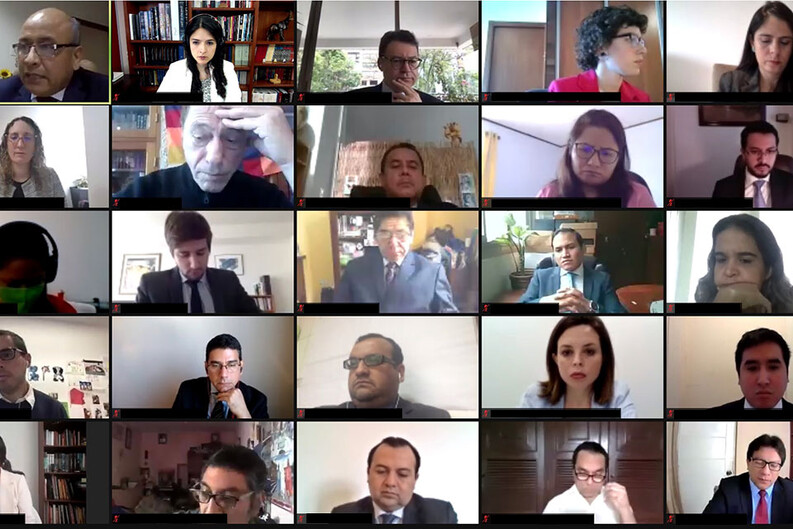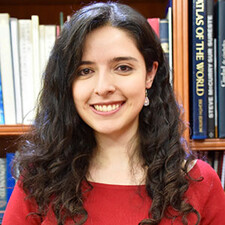Postgraduate Fellow Spotlight: Bernstein Fellow Patricia Cruz Marín ’20

Patricia Cruz Marín ’20 is spending her Bernstein Fellowship at the Center for Justice and International Law (CEJIL), an organization that helps victims of serious human rights violations navigate the Inter-American System of Human Rights. She has been working with CEJIL’s Washington, D.C. offices from Mexico City on the litigation of cases at the Inter-American System and on a research project related to compliance with the Inter-American Court of Human Rights’ judgments. CEJIL is well-known in the Inter-American System — it has the distinction of representing the highest number of cases before the Court — and Cruz Marín chose to pursue her Fellowship there in order to work closely with victims at the international level. “Since the start of her fellowship in July, Cruz Marín has learned about the inner workings of the Inter-American system and the many “political and victim-centered considerations one must have when taking legal action in defense of human rights.”

Cruz Marín’s academic preparation at Yale Law School, the Universidad Nacional Autónoma de México (UNAM), and the Instituto Tecnológico Autónomo de Mexico (ITAM) inspired her to pursue this opportunity. Her passion for human rights led her to participate as a law student in moot court competitions simulating proceedings in the Inter-American Court of Human Rights. This involvement inspired her to research compliance with the Inter-American Court’s judgments for her dissertation in law. Before coming to Yale, she worked at a clinic against human trafficking, where she continued to guide the legal representation of victims using precedents established by international human rights law.
The COVID-19 pandemic has shaped the structure and substance of Cruz Marín’s fellowship. “If it were not for COVID-19,” Cruz Marín said, “I would be in Washington, D.C.” The hearings are now virtual and CEJIL relies on video calls to collaborate with colleagues and clients across different countries. In light of the pandemic, Cruz Marín explained, CEJIL participated in a project on Venezuelan prisons; Cruz Marín helped to maintain provisional measures of protection through the Inter-American Court for incarcerated people who are living in poor conditions. “The state,” she explained, “has to respond to this request regarding the lack of water, food, and medical attention for people in the Venezuelan penitentiary system.”
In addition to helping CEJIL investigate and prepare legal strategies, Cruz Marín has been working on the issue of compliance with the Court’s judgments. One hearing in which she participated involved victims of a 1991 massacre in the Peruvian village of Santa Bárbara; accompanied by representatives from CEJIL, survivors of the massacre denounced the Peruvian government’s lack of compliance with the Court’s 2015 judgments requiring it indemnify the victims and hold accountable those responsible for these human rights violations, among other measures. Cruz Marín participated in the October hearing, helping to demonstrate the non-compliance of Peruvian authorities with the victims’ calls for justice after almost three decades after the massacre.
As part of her work on compliance, Cruz Marín has also participated in the representation of the Kichwa de Sarayaku Indigenous community in Ecuador’s Constitutional Court. In 2012, she explained, the Inter-American Court of Human Rights ruled against Ecuador for violating the community’s right to life and property; it determined that the state should remove “pentolite explosives” from the Kichwa de Sarayaku territory and, moving forward, should consult with the community prior to pursuing similarly hazardous projects on their land. CEJIL, Cruz Marín explained, is helping represent the Sarayaku people, urging Ecuador’s Constitutional Court to prioritize the case after eight years of inaction by the government.
As part of the research on compliance, Cruz Marín is exploring how the Court’s impact can be strengthened so that its effectiveness does not depend on a state or other actor’s willingness to obey a judgment. “Strengthening the Inter-American System of Human Rights,” she said, “and its impact, is part of CEJIL’s mission.” Cruz Marín believes “we need to visualize the impact beyond compliance.” She wrote her thesis on this issue, arguing that moving past the sole reliance on states to comply with judgments can strengthen the Inter-American System’s potential impact. Cruz Marín believes that academics can also play an important role in analyzing the system and proposing ways to enhance its impact.
Cruz Marín has “familiarized herself with the Inter-American System in practice” and expanded her “litigation capabilities.” She has learned about the defense of human rights in an international context, and she has become more sensitive to litigation’s political considerations. “Taking the judicial path is not always the best option,” Cruz Marín said. “The political context can help inform your argument and decisions in a case where what you can achieve legally may be incompatible or conflicting with what is best for the client.”


